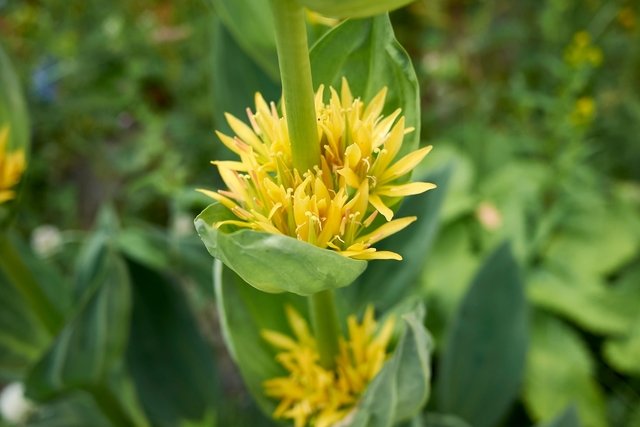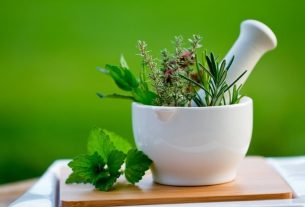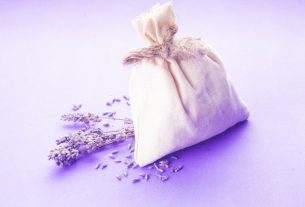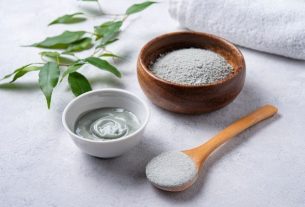Gentian is a medicinal plant, of the species Gentiana luteaindicated to help in the treatment of gastrointestinal problems, such as poor digestion, heartburn, gastritis, nausea or vomiting, for example, due to its antiemetic, anti-inflammatory and digestive properties.
The normally used parts of this medicinal plant are the roots, from which active substances, such as gentilin, alkaloids, tannins and essential oils, are extracted to prepare tea or tincture.
Gentian can be found in health food stores or compounding pharmacies, and should be used under medical advice or from a professional specializing in medicinal plants.

What is it for
Gentian is indicated for:
- Excess intestinal gas;
- Abdominal colic;
- Indigestion;
- Nausea and vomiting;
- Diarrhea or dysentery;
- Heartburn or gastritis;
- Intestinal worms;
- Anemia.
Furthermore, the substance that gives the plant the bitter taste, amarogentin and gentilin, stimulate the taste buds and, thus, increase appetite and can be indicated to help increase appetite.
The benefits of gentian are due to the substances in its composition, such as gentianin, gencialutin, gentiopicrin, genciamarin, pectin, tannins, glycosides, essential oils and gentianic acid, which give it antiemetic, anti-inflammatory, digestive, laxative, tonic and antipyretic properties. and antacid, for example.
Although it has many health benefits, gentian consumption should not replace treatment recommended by a doctor, and should be used with the guidance of a doctor or herbalist.
The parts of the gentian used are the roots for preparing tea or tincture.
1. Gentian tea
Gentian tea should be taken before meals.
Ingredients
- 1 teaspoon of dried and chopped gentian root;
- 1 cup of water.
Preparation mode
Bring the water to a boil and then turn off the heat and add the dried and chopped gentian root. Cover and let rest for about 5 to 10 minutes. Strain, wait for it to cool and drink 1 cup of tea, 2 to 3 times a day.
2. Gentian tincture
Gentian tincture can be purchased at compounding pharmacies or health food stores, and a dose of 1 to 4 mL of the tincture diluted in water, up to 3 times a day, is normally recommended for adults.
The use of gentian tincture must be guided by a doctor or herbalist.
Possible side effects
The side effects of gentian appear when this plant is consumed in large quantities, which can cause headaches, vomiting and gastrointestinal discomfort.
Who shouldn’t use
Gentian should not be used by children, pregnant or breastfeeding women, or by people with high blood pressure, a predisposition to headaches or who have ulcers in the stomach or intestine.
Furthermore, as it contains alcohol, the use of gentian tincture is contraindicated for people undergoing treatment for alcoholism who use the medicine disulfiram.
Bibliography
- JIANG, M.; et al. Genus Gentiana: A review on phytochemistry, pharmacology and molecular mechanism. J Ethnopharmacol. 264. 113391, 2021
- DE VITA, S.; et al. Biological Profile of Two Gentiana lutea L. Metabolites Using Computational Approaches and In Vitro Tests. Biomolecules. 11. 10; 1490, 2021
- Schmidit, I. The Lexicon of Medicinal Plants. 1 ed. Dinalivro, 2007. 124-125.
- PONTICELLI, M.; et al. The healing bitterness of Gentiana lutea L., phytochemistry and biological activities: A systematic review. Phytochemistry. 206. 113518, 2023
- COSTA, Eronita. Nutrition & Phytotherapy. 2nd. Brazil: Vozes Ltda, 2011. 153-154.
- FLORIEN. Gentian. Available at: <https://florien.com.br/wp-content/uploads/2016/06/GENCIANA.pdf>. Accessed on 29 Nov 2023
- IBURG, A. The guide to medicinal plants: ingredients, medicinal effects and applications. 1.ed. Caracter, 2010. 120-121.

Sign up for our newsletter and stay up to date with exclusive news
that can transform your routine!
Warning: Undefined array key "title" in /home/storelat/public_html/wp-content/plugins/link-whisper-premium/templates/frontend/related-posts.php on line 12
Warning: Undefined array key "title_tag" in /home/storelat/public_html/wp-content/plugins/link-whisper-premium/templates/frontend/related-posts.php on line 13



